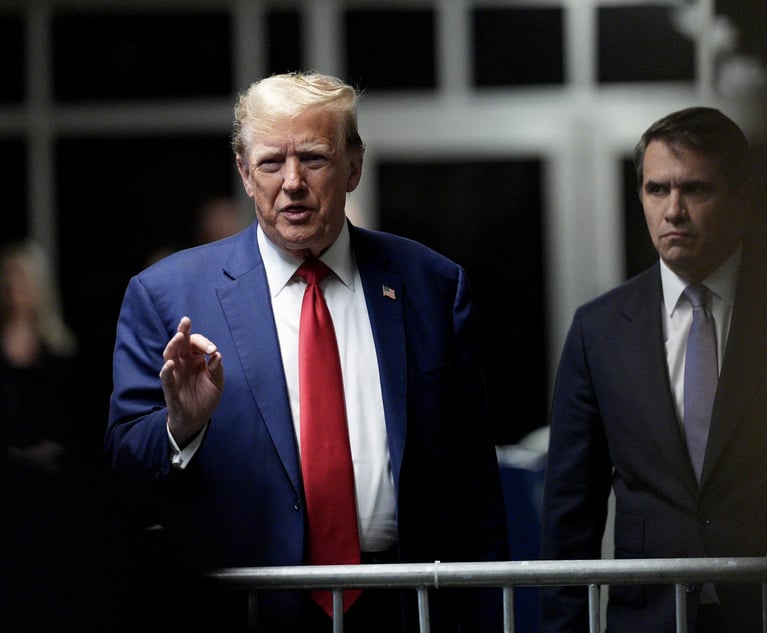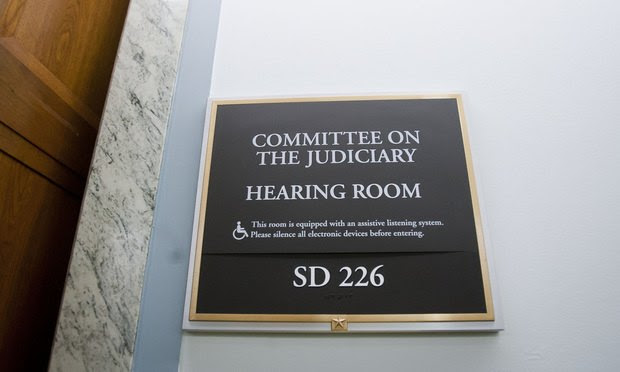Trump Watch: What's Next For Trump's Court Nominees | Verrilli's ACA Encore
Conservatives boasted a big year on judicial nominations in 2018, a trend that will continue in 2019.
January 04, 2019 at 01:15 PM
6 minute read
Welcome back to Trump Watch, your weekly guide to the Trump presidency and the law. This week, we're taking a look at what's next for President Donald Trump's judicial nominations. Plus, who are the players that'll drive Trump's continued remake of the federal judiciary? Some of your questions, answered below!
Thanks for checking out Trump Watch. We're hoping you had a nice holiday break. As always, let us know what you're interested in seeing in this newsletter, and please send tips to [email protected]. You can also catch me on Twitter @elliskkim.
The Trump administration's push to remake the federal judiciary resumes this month, with new faces leading the renovation, and a stack of nominees who will have to be resubmitted.
Conservatives boasted another big year on judicial nominations in 2018, confirming 18 judges to the powerful appeals courts. Trump has gotten 30 circuit court picks confirmed in two years, a pace that exceeds any of his predecessors in the same time frame.
Still, the Trump administration's normal production-line efficiency in nominating and approving federal judges hit a snag late last year thanks to former Sen. Jeff Flake's blockade and the lack of a year-end confirmation package. At the end of last year, there were a dozen appeals court nominees and more than 50 district court picks still pending in the Senate.
What's next for Trump's nominees? Conservative lawmakers won't wait too long to clear the deck on Trump's court picks. Senate Republicans are aiming to confirm a slate of nominees early this year, according to two aides.
First, the White House will have to resubmit nominations that lawmakers did not take up last year. Nominations watchers are keeping close tabs on whether the White House resubmits controversial picks like Ogletree's Tom Farr, a nominee for the Eastern District of North Carolina whose past record in voter rights-related cases led the Senate's lone black Republican, Sen. Tim Scott of South Carolina, to oppose his bid.
Once resubmitted, nominees will return to the Senate roughly at the stage where they left. A significant chunk of nominees—including six circuit court picks—have already had their confirmation hearings, teeing them up for swift votes out of committee and onto the Senate floor. Nominees who have already had their confirmation hearings generally do not redo them, although Democrats could press Republicans on the committee to hold new hearings for a handful of nominees, including those who had sparsely-attended sessions in October.
Nominees who have already been favorably reported to the Senate floor will have to return to the panel, where members will vote them out of committee once more.
Numbers in nominees' favor: Conservatives are optimistic about judicial confirmations for 2019. Republicans in the last midterm election widened their 51-seat majority in the Senate to 53 seats. That means Trump's nominees will have an easier pathway to confirmation than during the first two years of the Trump presidency, when the defection of just two Republican senators could sink—and indeed, at times, did sink—a nomination.
Who's shepherding Trump's nominees? There will be some new and familiar faces leading the Trump administration's judicial nominations project this year. Sen. Lindsey Graham, R-South Carolina, is expected to wield the gavel as incoming chair of the judiciary committee, becoming the point-person on Trump nominations in the Senate along with Majority Leader Mitch McConnell.
Graham is replacing Sen. Chuck Grassley, R-Iowa, who's stepped down from his chairmanship but will remain on the committee. Republicans have added a few newcomers to join Grassley, Graham, and the other senators on the committee, according to a list released Thursday. They include Sen. Joni Ernst of Iowa, and newly-elected senators Marsha Blackburn of Tennessee, and ex-Missouri Attorney General Josh Hawley, a former clerk to Chief Justice John Roberts.
Across town, White House counsel Pat Cipollone will lead the effort in nominating judges, identifying picks for key vacancies in circuit and district courts. He takes over the work of his predecessor, Donald McGahn, who left the White House in October. Cipollone and his staff will continue to work alongside the Justice Department's Office of Legal Policy, and OLP head Beth Williams, to vet nominees.
 Donald Verrilli of Munger Tolles.
Donald Verrilli of Munger Tolles.
Trump Docket
>> An appeal in ACA litigation. The state attorneys general who have led the legal defense of the Affordable Care Act are appealing a Texas federal judge's ruling to the Fifth Circuit, after the judge in December declared the entirety of the 2010 federal health care law unconstitutional. The coalition of mostly-blue states, led by California AG Xavier Becerra, on Thursday filed their notice of appeal with U.S. District Judge Reed O'Connor in the Northern District of Texas.
>> Jumping into the fight. Backed by a newly-hired top counsel and a former U.S. solicitor general, the Democratic-controlled U.S. House of Representatives on Thursday moved to intervene as a defendant in the ACA lawsuit. DOJ Civil Appellate veteran Douglas Letter, who joined the House as a top lawyer in late December, and Munger, Tolles & Olson's Don Verrilli, who successfully defended the ACA's constitutionality at the Supreme Court in 2012, filed the motion with O'Connor late Thursday. You can find their opposed motion here and our story here.
>> A court win for the Trump administration. A three-judge panel for the D.C. Circuit on Friday handed a win to the Trump administration, lifting a lower court injunction on its transgender troops restrictions. Despite the order, the policy won't go into effect, since it's still subject to other nationwide injunctions. Meanwhile…
Marcia Coyle has a look at the appellate firms opposing the Trump administration's transgender ban at the U.S. Supreme Court. The justices are scheduled to look next week at petitions in cases where the DOJ has asked the Supreme Court to overturn injunctions that have blocked implementation of the rules.
>> No rest during the shutdown. The federal government is entering its 14th day of a shutdown, with no apparent end in sight. It's spurred federal judges to press pause on litigation in many civil cases, but my colleagues C. Ryan Barber and Mike Scarcella have a look at judges who've declined to slow down cases, including ones involving the Trump administration's asylum ban, its policies restricting access to contraceptives under the ACA, and more.
>> In case you missed it: Senate Judiciary has scheduled a Jan. 15-16 confirmation hearing for Bill Barr, the nominee for U.S. attorney general. You can find Barr's questionnaire here, and other documents he submitted for his nomination on the panel's website.
This content has been archived. It is available through our partners, LexisNexis® and Bloomberg Law.
To view this content, please continue to their sites.
Not a Lexis Subscriber?
Subscribe Now
Not a Bloomberg Law Subscriber?
Subscribe Now
NOT FOR REPRINT
© 2025 ALM Global, LLC, All Rights Reserved. Request academic re-use from www.copyright.com. All other uses, submit a request to [email protected]. For more information visit Asset & Logo Licensing.
You Might Like
View All
Legal Speak's 'Sidebar with Saul' Part II: GOP Pols Push Misinformation, Cohen Keeps It Together
1 minute read
Trump Barred From Appearing on Illinois Ballot as Overarching SCOTUS Decision Looms
4 minute read

The Judiciary's Electronic Court System Gets Poor Marks | Plus, A Look at Judicial Noms' Pay
6 minute readTrending Stories
- 1Meta Pulls Plug on DEI Programs
- 2On the Move and After Hours: Meyner and Landis; Cooper Levenson; Ogletree Deakins; Saiber
- 3State Budget Proposal Includes More Money for Courts—for Now
- 4$5 Million Settlement Reached With Stone Academy
- 5$15K Family Vacation Turned 'Colossal Nightmare': Lawsuit Filed Against Vail Ski Resorts
Who Got The Work
Michael G. Bongiorno, Andrew Scott Dulberg and Elizabeth E. Driscoll from Wilmer Cutler Pickering Hale and Dorr have stepped in to represent Symbotic Inc., an A.I.-enabled technology platform that focuses on increasing supply chain efficiency, and other defendants in a pending shareholder derivative lawsuit. The case, filed Oct. 2 in Massachusetts District Court by the Brown Law Firm on behalf of Stephen Austen, accuses certain officers and directors of misleading investors in regard to Symbotic's potential for margin growth by failing to disclose that the company was not equipped to timely deploy its systems or manage expenses through project delays. The case, assigned to U.S. District Judge Nathaniel M. Gorton, is 1:24-cv-12522, Austen v. Cohen et al.
Who Got The Work
Edmund Polubinski and Marie Killmond of Davis Polk & Wardwell have entered appearances for data platform software development company MongoDB and other defendants in a pending shareholder derivative lawsuit. The action, filed Oct. 7 in New York Southern District Court by the Brown Law Firm, accuses the company's directors and/or officers of falsely expressing confidence in the company’s restructuring of its sales incentive plan and downplaying the severity of decreases in its upfront commitments. The case is 1:24-cv-07594, Roy v. Ittycheria et al.
Who Got The Work
Amy O. Bruchs and Kurt F. Ellison of Michael Best & Friedrich have entered appearances for Epic Systems Corp. in a pending employment discrimination lawsuit. The suit was filed Sept. 7 in Wisconsin Western District Court by Levine Eisberner LLC and Siri & Glimstad on behalf of a project manager who claims that he was wrongfully terminated after applying for a religious exemption to the defendant's COVID-19 vaccine mandate. The case, assigned to U.S. Magistrate Judge Anita Marie Boor, is 3:24-cv-00630, Secker, Nathan v. Epic Systems Corporation.
Who Got The Work
David X. Sullivan, Thomas J. Finn and Gregory A. Hall from McCarter & English have entered appearances for Sunrun Installation Services in a pending civil rights lawsuit. The complaint was filed Sept. 4 in Connecticut District Court by attorney Robert M. Berke on behalf of former employee George Edward Steins, who was arrested and charged with employing an unregistered home improvement salesperson. The complaint alleges that had Sunrun informed the Connecticut Department of Consumer Protection that the plaintiff's employment had ended in 2017 and that he no longer held Sunrun's home improvement contractor license, he would not have been hit with charges, which were dismissed in May 2024. The case, assigned to U.S. District Judge Jeffrey A. Meyer, is 3:24-cv-01423, Steins v. Sunrun, Inc. et al.
Who Got The Work
Greenberg Traurig shareholder Joshua L. Raskin has entered an appearance for boohoo.com UK Ltd. in a pending patent infringement lawsuit. The suit, filed Sept. 3 in Texas Eastern District Court by Rozier Hardt McDonough on behalf of Alto Dynamics, asserts five patents related to an online shopping platform. The case, assigned to U.S. District Judge Rodney Gilstrap, is 2:24-cv-00719, Alto Dynamics, LLC v. boohoo.com UK Limited.
Featured Firms
Law Offices of Gary Martin Hays & Associates, P.C.
(470) 294-1674
Law Offices of Mark E. Salomone
(857) 444-6468
Smith & Hassler
(713) 739-1250









